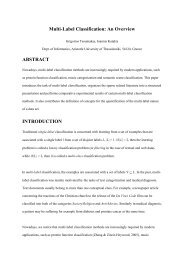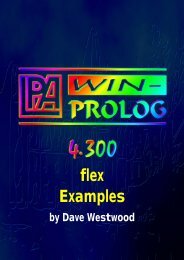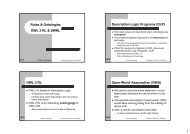Create successful ePaper yourself
Turn your PDF publications into a flip-book with our unique Google optimized e-Paper software.
7. Knowledge Specification Language 89<br />
satisfied with the highest score.<br />
ruleset example_set6<br />
contains all rules ;<br />
select rule using conflict resolution .<br />
Note that there is a high cost to using conflict resolution since every rule<br />
must be tested before the highest score is known.<br />
An adaptation of conflict resolution is to set a threshold value, so that the<br />
first rule whose conditions are satisfied and whose score is greater than the<br />
threshold value will be fired. This reduces the search somewhat.<br />
ruleset example_set7<br />
contains all rules ;<br />
select rule using conflict resolution<br />
with threshold 7 .<br />
The rules are selected using the conflict resolution scoring system with a<br />
threshold value (in this example the threshold value is 7).<br />
Finally, the <strong>flex</strong> programmer may specify a routine which makes a rule<br />
selection from the current agenda.<br />
ruleset example_set8<br />
contains all rules ;<br />
select rule using my_selector .<br />
Here <strong>flex</strong> will look for a program called my_selector/3 which should be<br />
defined with three arguments:<br />
my_selector( RuleAgenda, RuleConditions, Actions )<br />
where at the time of the call RuleAgenda will be instantiated to a list of the<br />
names of the rules currently in the rule agenda, and RuleConditions and<br />
Actions are variables which my_selector should bind to the conditions<br />
and actions respectively of the required rule. For more information see the<br />
description of the predicates new_rule/5, isa_rule/5 and<br />
forward_chain/5 in the "<strong>flex</strong> Predicates" chapter of this manual.<br />
Updating The Rule Agenda<br />
Each time a rule is fired, there is the option of updating the rule agenda for<br />
the next cycle of the forward chaining engine. The default is to leave the set<br />
of rules exactly as it is, so that the rules are always considered in the same<br />
order every time. Other options may be specified using the KSL keywords<br />
update ruleset<br />
The options are as follows.<br />
Each time a rule is fired it can be removed from the ruleset. This effectively<br />
<strong>flex</strong> toolkit



